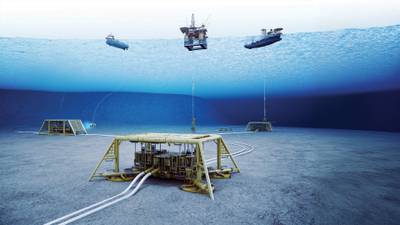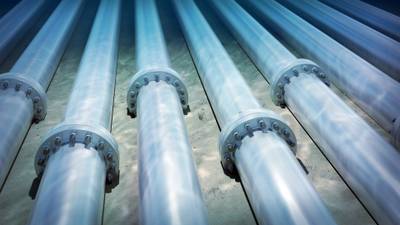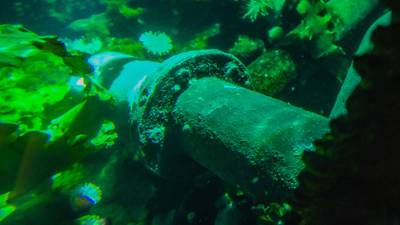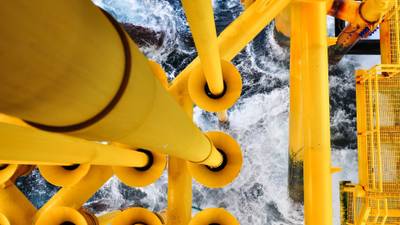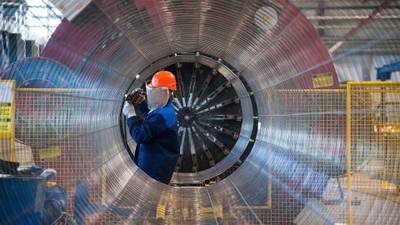Develop specialist subsea engineering skills with our online Flow Assurance course.
Study the issues we face as engineers working with the flow of fluids through pipelines and other structures.
Join this flexible online engineering course that fits around full-time work, and:
- gain a thorough grounding in fundamental fluid engineering, with a particular emphasis on system modelling and design
- enjoy expert teaching, invited lectures from experienced engineers, and direct industry input
- ensure you’re up to speed with new technologies and train in state-of-the-art flow assurance software.
Access our expertise and support wherever you’re based, with no need for a student visa, on a course that fits around full-time work.
Who can join this online Flow Assurance course for?
This distance-learning course is designed for graduate engineers looking to advance their careers in the energy sector.

Build credits towards a Masters degree
This online course is part of:
You can use the credits you earn on this short course towards either of these MSc qualifications.
What you’ll study
Transport of oil and gas through pipelines poses many challenges for the engineer. These challenges require a real grasp of the fundamentals of:
- fluid mechanics
- heat transfer
- phase changes
- deposition and/or obstruction
- erosion.
You’ll study the processes and problems associated with the flow of hydrocarbon product through subsea systems, with a particular emphasis on the fundamentals of system modelling and design.
You’ll gain knowledge and skills in single and multiphase fluid flow, thermodynamics and phase behaviour, including the effects of temperature and pressure, and heat transfer by conduction and natural or forced convection.
Topics you’ll cover include:
- chemical properties of the principal hydrocarbon fluids
- methods to assess the phase diagram and thermophysical properties of fluids transported along pipelines
- techniques to model single-phase and multiphase flow and resulting design implications
- causes and effects of waxing, hydrate build-up, asphaltenes, scale and other chemical obstacles to fluid flow through pipelines
- techniques to assess erosion and maintain pipelines free of obstructions
- mathematical techniques to model flow dynamics
- mathematical techniques for the thermal modelling of pipelines
- future design trends.
By the end of this Flow Assurance course, you will…
-
Have a non-specialist understanding of the basics of the chemical properties of the principal hydrocarbon fluids.
-
Understand the techniques to model flow and to consider design implications.
-
Know the causes and effects of waxing, hydrate build up, and other chemical obstacles to fluid flow through pipelines.
-
Learn techniques to maintain pipelines that are free from obstructions.
-
Be able to use mathematical techniques to model flow dynamics and the thermal modelling of pipelines.
-
Understand the design criteria for subsea pumps and separation systems and how these differ in deeper water.
-
Possess the expertise needed to contribute to detailed component design for subsea field systems and networks.
-
Be aware of future design trends.
I would definitely recommend studying with University of Aberdeen Online. Although the University is well known internationally for its academic excellence, what truly stands out is how closely the teaching staff work with students, regardless of whether they study on campus or online.
Ivan, Flow Assurance student, Quality Maintenance Engineer
How you’ll study
Online learning
This distance-learning Flow Assurance course is delivered flexibly, 100% online.
You can learn with us anywhere in the world, no student visa required, and manage your study hours to suit you.
Your teaching
This course is taught at Masters level.
Teaching is delivered through MyAberdeen, our online Virtual Learning Environment (VLE). It holds all the materials, tools and support you’ll need in your studies. Take a look around MyAberdeen.
You can access your learning materials on computer, smartphone and laptop, 24 hours a day. You’ll find a range of resources available, including:
- online lectures and tutorials
- reading materials
- discussion boards with your tutors, peers, and professional subsea engineers
- the online resources of our award-winning Sir Duncan Rice Library.
Your tutors
This Masters-level short course is delivered by our School of Engineering.
You’ll learn from academic and industry experts, with invited lectures from highly experienced subsea engineers working in oil and gas today.
Industry input
Your course content is also developed and reviewed by an Industry Advisory Board. This group of experienced professionals ensures your learning is always informed by the latest industry trends, technology, and career opportunities.
The support, communication, and engagement I’ve experienced as an online student make me feel truly connected to the university community. It’s a great balance between high academic standards and a personal, student-focused approach.
Ivan, Flow Assurance student, Quality Maintenance Engineer
You’ll be assessed online. Assessment will take place throughout the teaching term.
Types of assessment for this course may include:
- coursework
- online quizzes
- timed online open-book assessments.
Assessment deadlines
Your assessments will have submission deadlines, either during or at the end of the course. Your course coordinator will let you know when your assessment deadlines are, so you can plan your study time accordingly.
The course totals approximately 150 hours of study and assessment time. That’s around 10 – 15 hours per week.
This is an indicative guide to the time required for a typical student at this level to achieve the learning outcomes. This includes time for independent study, as well as teaching and assessments.
You can largely set your own study hours each week to cover the materials. MyAberdeen is available 24/7, so you can log in and study when it suits you.
Activities with deadlines
There will be some activities scheduled at fixed times, such as assessments with deadlines, or meetings with your tutor. But otherwise, you can access and work through the course at your convenience.
Our first-class support structure will ensure that you aren’t alone in your studies.
You’ll have contact with your coordinator via email, MyAberdeen, Microsoft Teams, or phone. You can use social media and discussion boards to chat with your fellow students too.
We provide a wide range of services to support you in your studies and beyond:
- Careers and Employability Service
- Disability support
- IT support
- Library support
- Student Support Service – help with finances, wellbeing and non-academic issues
- Student Learning Service – study support, with advice sessions available
- Aberdeen University Students’ Association (AUSA) – run by students for students
- Toolkit – clever apps and free training that can make your study life easier
Wherever you are in the world, you’ll feel part of our very special Aberdeen learning community.
Your course coordinator

Dr Dominic Van der A
Dominic is a Senior Lecturer within our School of Engineering. He specialises in coastal engineering.
Dominic’s research is aiding our understanding of fundamental processes in the coastal zone and the development of new and improved tools for engineers facing the challenges of climate change and sea-level rise.
View Dominic’s profileWhere this will take you
Towards a Masters
You’ll earn 15 credits at Masters level (SCQF Level 11) with this course. You can use these credits towards our:

Masters in Oil and Gas Engineering
Join an accredited online Masters degree delivered from the Energy Capital of Europe. Master the skills and technologies you need to pursue a career in the upstream and downstream oil and gas industry.
View MSc Oil and Gas Engineering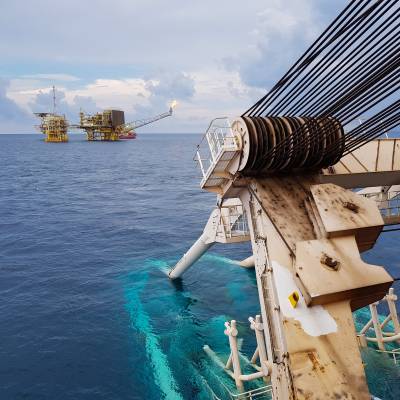
Accredited Masters in Subsea Engineering
Become a subsea engineer with our accredited online MSc. Train in the fundamental skills and technical knowledge demanded by the subsea sector today.
View MSc Subsea EngineeringBuild your learning
We offer a range of specialist online engineering and technology courses you can use to build your skills.
Many carry credits you can build up into postgraduate qualifications, including Masters degrees:
Careers
This course will help develop your career as a graduate engineer already working in, or with ambitions to work in, the subsea engineering sector.
Continuing Professional Development (CPD)
Your employer or professional institute may recognise this course for CPD hours. Talk to your employer or institute to find out more.
As I am currently on paternity leave and caring for my child, studying online provides an ideal opportunity to continue developing my professional skills while staying at home.
Ivan, Flow Assurance student, Quality Mainenance Engineer

Free career support
Access our free careers service while you study.
- 1:1 appointments
- CV checks
- Interview prep
- Job opportunities
Entry requirements
Entry requirements
We welcome students from all over the world.
This course has no formal entry requirements. You do not need to provide proof of your qualifications.
But you do need to check the entry guidance above to understand the level of teaching delivered, to decide if this course is right for you.
If you do not have qualifications from the UK, check the equivalent teaching level for your country.
Visa requirements
You do not need a student visa to study online with us.
English language requirements
Teaching is delivered in English.
You do not have to provide proof of your English language skills to join this course. But we want to make sure that you can use English well enough to study successfully.
Recommended level of English
For this course, we recommend the following level of English language proficiency.
These are our Postgraduate Standard requirements, and these are minimum scores.
IELTS Academic, IELTS UKVI Academic, or IELTS Online (not IELTS Indicator or IELTS General Training)
- 6.5 overall
- 5.5 for listening, reading and speaking
- 6.0 for writing
TOEFL iBT or TOEFL iBT Home Edition
- 90 overall
- 17 for listening
- 18 for reading
- 20 for speaking
- 21 for writing
- TOEFL DI code is 0818
Cambridge English: B2 First, C1 Advanced, or C2 Proficiency
- 176 overall
- 162 for listening, reading and speaking
- 169 for writing
LanguageCert Academic / LanguageCert Academic SELT
- 70 overall
- 60 for listening, reading and speaking
- 65 for writing
Oxford ELLT Digital – English Language Level Test Online
- 7.0 overall
- 5.0 for listening, reading and speaking
- 6.0 for writing
PTE Academic (online test not accepted)
- 62 overall
- 59 for listening, reading, speaking and writing
Skills for English: SELT
- B2 pass with merit
Duolingo – tests taken from 1 July 2024 onward
- 120 overall
- 95 for listening, reading and speaking
- 105 for writing
University of Aberdeen English Pre-sessional Programme (PSE)
- Pass
- Valid for one year. Refresher can be offered if out of date
Pre-sessional academic English preparation programmes undertaken at other UK universities
- Pass at an equivalent of 6.5 (C1)
- B2 in all four skills
- Certification must be within one year prior to the start of your course
For full information about language requirements, see our English Language Requirements page.
You will need access to:
A computer (PC, laptop or Mac) with an up-to-date operating system
Most teaching materials are smartphone- and tablet-friendly. But we recommend a proper laptop or desktop for completing assignments comfortably.
Reliable internet access
We recommend:
- a wired connection
- a minimum download speed of 2 Mbps so you can take part fully in live sessions.
Speakers or headphones
- We recommend a headset with built-in microphone and earphones if you’re likely to study in an environment with background noise.
- A webcam is optional, but you may like to use one for some interactive sessions.
Software
We’ll give you access to Office365 applications. This means you can use online versions of Microsoft Word, Excel, PowerPoint and OneDrive and install these programs on up to five personal devices.
If your course requires specialist software, we’ll provide you with access to this and a licence that lasts throughout your studies.
See our detailed IT requirements for more information.
When you study with us, you can expect a first-class support structure so that you’re never alone in your studies.
But learning online does mean you have to motivate yourself and manage your own time.
Your most important commitment will be time – the time to work through, reflect on and understand your teaching materials.
Before you start a course that involves a high degree of independent study, we recommend looking at the time you will be able to devote to your studies each week:
- Be realistic
- Create a weekly schedule as a guide
If you have any questions about studying online, get in touch with our friendly team. We’re here to help.
Fee payment
Your course fee needs to be paid in full before you start your course.
We accept payment via Visa Debit, Visa Credit and Mastercard.
Ways to save
You may be able to get help funding this course via:
- discounts – if any discounts are available for this course, they’ll appear in the section below
- employer sponsorship – we accept full and partial fee payments from sponsors.
Find out more about funding options.
Student card
All our students are entitled to a University of Aberdeen student card. This gives you access to a range of student discounts around the city and online.
Learning resources
Access to all the essential books and resources you need are included in your tuition fee. They’ll be made available to you online and you do not have to buy your own copies.
We also provide optional recommended reading lists. Many of these resources are available electronically through our library, although purchases may be required if you wish to read the full list.
Printing
You may want to set aside a small budget for printing, depending on how you like to work.
This course has no formal entry requirements. You decide if it’s suitable for you.
The course is delivered at Masters level. For this course, you’d usually have at least:
- a 2:1 UK honours degree (or equivalent) in Engineering or related discipline, or
- an alternative qualification with an appropriate level of relevant industry experience.
Since the course includes a significant level of mathematical content a good foundation in engineering mathematics is essential.
Basic knowledge and understanding of fluid mechanics, chemistry and thermodynamics is desirable.

